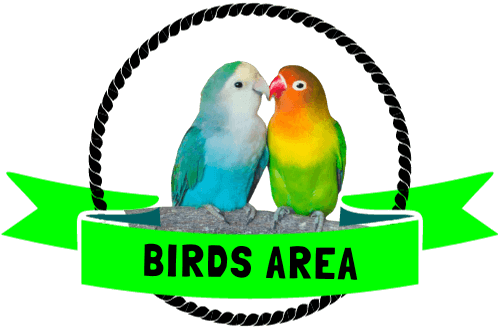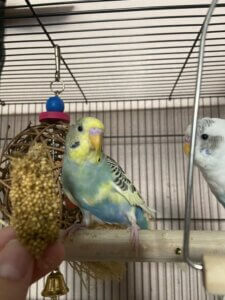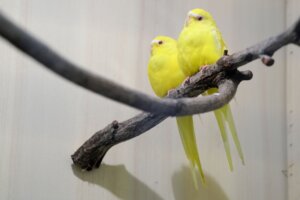Can Budgies And Cockatiels Eat The Same Food?
The short answer is yes. Budgies and cockatiels can eat some of the same foods, but they also have different dietary needs. It’s essential to understand what both birds require to stay healthy.
Budgies and cockatiels are both popular pet birds, but many owners wonder if they can share the same food.
They both belong to the parrot family, but that doesn’t mean they have the exact same dietary needs. Sharing food can work, but there are things to watch out for.
Let’s explore what food they can safely share and where they differ.
Understanding Budgie and Cockatiel Diets

Budgies and cockatiels naturally eat seeds, fruits, and vegetables. However, they need different nutrients to stay healthy. Knowing this helps you choose the right diet for each bird.
- Budgies: In the wild, budgies eat mostly seeds, grains, and fresh greens. In captivity, they need a balanced diet that includes pellets, seeds, and fresh foods. Too many seeds can make them overweight.
- Cockatiels: Cockatiels have similar needs but require more calcium and larger seeds. They thrive on a mix of pellets, seeds, fresh veggies, and some fruits.
Can Budgies and Cockatiels Eat the Same Food?

Yes, but with a few considerations. Pellets made for both budgies and cockatiels are usually safe. Pellets contain a balanced mix of nutrients. Some brands create pellets specifically for small parrots like budgies and cockatiels.
However, cockatiel pellets are often larger. If you use these, make sure they are small enough for budgies to eat.
Foods Suitable For Both Budgies And Cockatiels
Here’s a list of foods that are safe for both budgies and cockatiels:
- Seeds: Both enjoy seeds, but don’t rely on seeds alone. They can make your bird overweight. Use seeds as treats, not the main diet.
- Fruits: Apples, grapes, and berries are great for both. Avoid seeds from fruits like apples as they can be toxic.
- Vegetables: Carrots, spinach, and peas are safe and full of vitamins. They provide a good balance to their diet.
- Cooked Grains: Brown rice, quinoa, and oats can be offered occasionally.
Foods to Avoid For Both Budgies And Cockatiels
Some foods are not safe for either bird. Keep these out of their diet:
- Avocado: Toxic to both budgies and cockatiels.
- Chocolate: Never feed chocolate; it can cause serious health issues.
- Caffeine: Avoid tea, coffee, and caffeinated drinks.
- Salt: High salt levels are harmful.
Many bird owners on forums like Quora and Reddit share their experiences feeding budgies and cockatiels together. Some say their birds happily share food, while others notice their budgies prefer smaller seeds.
One user on the Lafeber forum mentioned: "I feed both my budgie and cockatiel the same pellets, but I break up the larger pieces for the budgie." This shows that you can successfully feed them the same diet with minor adjustments.
Can Budgies Food Cause Any Issues For Cockatiels?

Yes, budgie food can cause issues for cockatiels if fed exclusively. Budgie food often consists of smaller seeds like millet, which are fine in moderation but don’t meet the nutritional needs of cockatiels.
Cockatiels require a more varied diet, including larger seeds, specific pellets, and more calcium. Relying solely on budgie food can lead to nutritional deficiencies, especially a lack of calcium, which is crucial for cockatiels.
Additionally, budgie seed mixes may contain high-fat seeds, like sunflower seeds, which can cause weight gain in cockatiels if eaten too often. Cockatiels also risk selective eating, picking out only seeds and ignoring other nutritious foods.
Mix cockatiel-specific pellets with fresh vegetables to prevent issues and use seeds as treats. This ensures a balanced diet and covers all their nutritional needs. Always aim for a varied diet to keep your cockatiel healthy.
What to Consider When Feeding Both Birds?

When feeding both budgies and cockatiels, several essential factors must be considered to keep them healthy and happy.
1. Portion Size and Nutritional Needs
Portion size is crucial. Budgies are smaller birds, so they naturally require smaller portions of food. Cockatiels, on the other hand, need larger servings to meet their energy needs.
If you’re feeding them the same diet, adjust the portions accordingly. Overfeeding a budgie can lead to obesity while underfeeding a cockatiel might result in nutritional deficiencies.
Additionally, cockatiels require more calcium. Including calcium-rich foods like leafy greens or a cuttlebone in their diet ensures they get the necessary nutrients.
Budgies also benefit from a varied diet, but high-fat seeds should be offered in moderation to avoid weight gain.
2. Pellet Size and Feeding Habits
The size of pellets matters when feeding these birds. Cockatiel pellets are often larger than those made for budgies.
If you’re offering cockatiel pellets, make sure they are small enough for budgies to eat without difficulty. You can break larger pellets into smaller pieces to suit the budgie’s smaller beak.
Watching their eating habits is also essential. Use separate feeding dishes to ensure each bird gets its fair share of food.
This method helps prevent one bird, especially the more assertive cockatiel, from dominating the feeding area.
3. Importance of a Varied Diet
A varied diet is essential for both budgies and cockatiels. Offering a mix of fresh fruits and vegetables, such as apples, grapes, spinach, and carrots, provides essential vitamins and minerals.
Fresh foods not only add nutritional value but also keep the birds interested in their meals. Rotating the types of seeds, pellets, fruits, and vegetables prevents them from getting bored and ensures a balanced intake of nutrients.
However, not all human foods are safe. Avoid feeding them toxic foods like avocado, chocolate, and caffeine to keep them healthy.
4. Fresh Water Supply
Always provide a fresh water supply for both birds. They need clean water to stay hydrated and healthy. Change the water daily to keep it free from bacteria and food particles.
This simple habit helps maintain their overall well-being and supports their dietary needs. A freshwater supply is just as important as the food they eat.
However, bird experts often suggest that feeding the same food is okay as long as it meets both birds’ nutritional needs. Dr. Chris Ross, an avian vet, says, “While budgies and cockatiels can share many foods, owners must ensure the diet is balanced, focusing on variety and the right portion sizes.”
Final Thoughts – Can Budgies and Cockatiels Eat the Same Food?
Yes, budgies and cockatiels can eat many of the same foods. Just be mindful of portion sizes and nutritional needs. A balanced diet is key to keeping both birds healthy. Including a variety of pellets, seeds, fruits, and veggies helps meet their needs.
If you’re new to bird care, start with pellets designed for small parrots. Then, add in fresh foods to keep their diet exciting and nutritious.
Read more





